Emily Andrews argues in her essay “Why I Don’t Spare “Spare Change”” that it does more harm than good to give money to beggars on the street rather than giving to an organization such as United Way to help the needy, pointing out that “one cannot be certain that one is giving to a needy individual” and that by giving to a charitable organization “ones money is likely to be used wisely.”
I believe Andrews has set up her essay well, her title alerting the reader of the topic, having an attention-grabbing sentence in the first paragraph starting with common phrases as “poor but honest”, and having a sense of her audience, taking account of how her readers feel about her arguments. However, I do think that she has made some problematic assumptions, lack of ethos, and not tying her arguments together to make them relevant throughout the essay. All of her arguments are completely opinionated, as she states in paragraph one and six that her statements are of “her own feeling” and “admittedly based on no evidence.” She demonstrates this in the first paragraph by first questioning the all-to common phrases “the deserving poor” and “poor but honest.” Phrases that Andrews associates when thinking about “the poor.” She also brings in the idea that perhaps people, through drug and alcoholism, have “ruined not only their own lives” but “also the lives of others” in order to “indulge in their own pleasure.” Therefore not worth being labeled as “the deserving poor.”
Why did Andrews all of a sudden bring up drug and alcohol abusers while on the topic of people classified as poor? It feels that the argument is incomplete and had no intended connection between the two. She could argue that drug and alcohol abusers may make up a good portion of people classified as poor, however she does not present any sort of facts to confirm this. She states that –although admittedly without any “serious study”- she feels she can classify these drug and alcohol abusers as “the undeserving poor” and thus why she doesn’t “distribute to panhandlers”. In the second paragraph-now having stated her thesis- she responds to what her readers may have felt when voicing her opinion of “the undeserving poor”, surly there are beggars on the street who are “deserving” right? This demonstrates her awareness of her audiences’ feelings and understandable protest. She responds by challenging the readers view, “deserving of what? My spare change? Or governments assistance?” now putting the readers in perspective she proposes that the best method of helping the poor is to donate to organizations such as United Way to help the poor, arguing that by giving money to a panhandler, one can never be sure whether he or she truly helped a needy individual or supported a con artist. As stated in paragraph three, by giving to a charity to help needy individuals “one can feel that one’s money is likely to be used wisely.”
Andrews could’ve used this argument as a way to tie drug and alcohol abusers with “the poor”, arguing that, although not sure how common people classified as poor have drug or alcohol problems, no one can be certain that the money you give to a stranger on the street won’t be spent on drugs, alcohol or any other harmful substance, rather than a cup of coffee or a sandwich. In the last three paragraphs, Andrews uses a personal example of encountering a few panhandlers. Noting a beggar who is always at her bus stop, being such a regular that Andrews makes the judgment that “he ought to be able to hold a regular job”. While admitting that she doesn’t encounter more than three or four beggars a week, she states that most likely these people simply prefer begging to working. Using a personal example is a good form of ethos Andrews uses despite not using it anywhere else in her essay. Another good thing is she always states when her argument or assumption is solely opinion-based, as she defends her personal assumption of the personal encounter with the beggar at her bus stop, “I’m not generalizing about street people” and “I am only talking about the people whom I actually encounter.” In short, Emily Andrews has done a good job setting up her essay, while getting her point across nicely, but, as the title suggests, “why I don’t spare “spare change”’ her essay is completely based on assumptions and should not be cited when researching about the poor.





